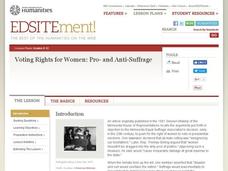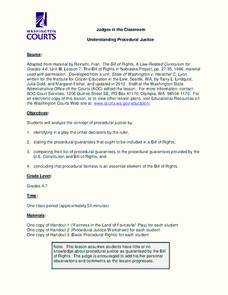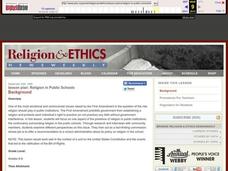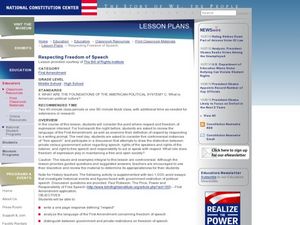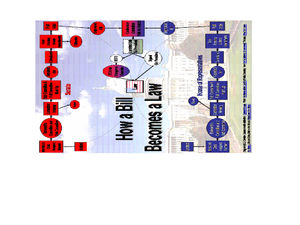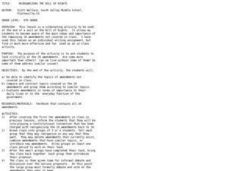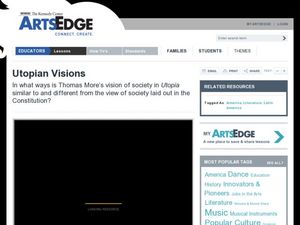Administrative Office of the US Courts
Hazelwood v. Kuhlmeier
Freedom of speech is not always free. Scholars investigate how the First Amendment provides for the right to express opinions. Through the court case Hazelwood v. Kuhlmeier, they analyze free speech using primary documents—and hopefully...
Curated OER
Voting Rights for Women: Pro- and Anti-Suffrage
Students examine the arguments for and against suffrage for women in the 19th and early 20th centuries. They explore various websites, read and discuss primary source documents, develop a document from two points of view, and analyze...
Civil Rights Movement Veterans
Timeline of Events: 1960’s Civil Rights Movement of St. Augustine, Florida
A timeline can be a powerful learning tool because it reveals a pattern in events. While few would consider St. Augustine, Florida a hotbed of the 1960s Civil Rights Movement, a selection of background information and a timeline of...
Curated OER
Understanding Procedural Justice
Learners analyze the concept of procedural justice. For this judges in the classroom instructional activity, students role play the ways the U.S. Constitution and Bill of Rights established certain procedures to protect people from...
Curated OER
Divided We Fall
Students examine the Bill of Rights. In this U.S. Constitution lesson, students write essays for perform plays that feature the importance of the first ten amendments. Students imagine the United States without 1 of the amendments that...
Curated OER
The First Amendment
Students examine the freedoms and rights guaranteed by the First Amendment. In this Bill of Rights lesson, students review court cases and create a collage that require them to consider the right they are guaranteed by the First Amendment.
Curated OER
Religion in Public Schools
Seventh graders conduct research on important background information regarding the role of religion in American public schools. In this Ethics lesson, 7th graders examine and become familiar with the First Amendment of the Bill of...
Curated OER
Our National Documents
Learners explore the significance of National Documents. In this National Documents lesson, students read handouts regarding the Declaration of Independence, the U.S. Constitution, and Bill of Rights. Learners complete the provided...
Curated OER
Respecting Freedom of Speech
Learners analyze the First Amendment. In this Bill of Rights lesson, students listen to their instructor present a lecture regarding the facets of the First Amendment. Learners examine cases which pertain to the freedoms that the...
Curated OER
Beyond the Playing Field -Jackie Robinson, Civil Rights Advocate
Students examine and discuss documents pertaining to issues of the civil rights movement.
Curated OER
How Government Works and the Rights of the People
Eighth graders identify how to be responsible citizens. In this civics lesson, 8th graders review websites of congressional members and then create questionnaires about the responsibilities of citizens.
Curated OER
Reorganizing the Bill of Rights
Eighth graders look critically at the 26 amendments to the United States Constitution.
Curated OER
Fairy Tails Can Show Due:It can happen for you, If you play your part.,
Learners view a Reader's Theater focusing on the story of Goldilocks and the Three Bears. The story is used as a springboard into a videotaped mock trial of Gold E. Locks developed by the American Board of Trial Advocates (ABOTA). They...
Curated OER
Civil Rights: An Investigation
High schoolers take a closer look at the political side of the American Civil Rights Movement. For this 20th century American history lesson, students research the contributions of President Johnson, Dr. Martin Luther King, Jr., and J....
K12 Reader
Will You Stay and Play?
Start off your day with a study of -ay words. Pupils can practice long a with -ay words by reading the brief poem included here. After they read, class members answer three reading comprehension questions right on the page.
Curated OER
Utopian Visions
Students examine Sir Thomas More's Utopian vision. In this philosophy lesson, students read Utopia and determine the pros and cons of Utopian societies. Students then create and present monologues of residents of the Utopia.
Curated OER
Who’s Got Rights? An Introduction to Human Rights and Human Rights Defenders
High schoolers explore human rights issues. In this social justice instructional activity, students examine human rights as they read segments of the "Universal Declaration of Human Rights," discuss photographs with human rights...
Judicial Branch of California
The Power of the Press: The First Amendment
Was what happened in 1886 at the Haymarket riot a crime or a case of xenophobia? Using political cartoons from the time, young historians consider the role the media played in anti-labor sentiment during the time and how that influenced...
Curated OER
Getting to Know the Founding Fathers
Learners focus on the values of moderation and self-discipline as exemplified by the U.S. Constitution and the Founding Fathers. Students participate in dialogues and role-plays.
Student Handouts
A New Presidency
Use this quick informational text to give your class an introduction to President Bill Clinton and Hillary Rodham Clinton, first lady at the time of the events in the text. Individuals or partners can read the brief text and respond to...
Curated OER
Aquarium Bill of Rights
Students review the Bill of Rights on Aquademics and list the rights that are guaranteed to United States citizens. In groups, they role play the role of important leaders whose rules would make a difference for the lives of fish in...
National First Ladies' Library
Government: Defending the Bill of Rights
Pupils examine the proposition of a country without the Bill of Rights. In a role-playing activity, teams of students gather information to build a case for retaining the Bill of Rights and present it before their congressperson.
Curated OER
How Women Won the Right to Vote
Students consider how women gained the right to vote in America. In this suffrage lesson, students investigate major events of the suffrage movement and conduct research. Students also role play petitioning to President Wilson to get the...
National Constitution Center
Abraham Lincoln's Crossroads
History enthusiasts participate in an interactive website that brings Abraham Lincoln to life as he shares his personal experiences between 1854-1864. Scholars listen and read carefully to form their own opinions and discover if they...



